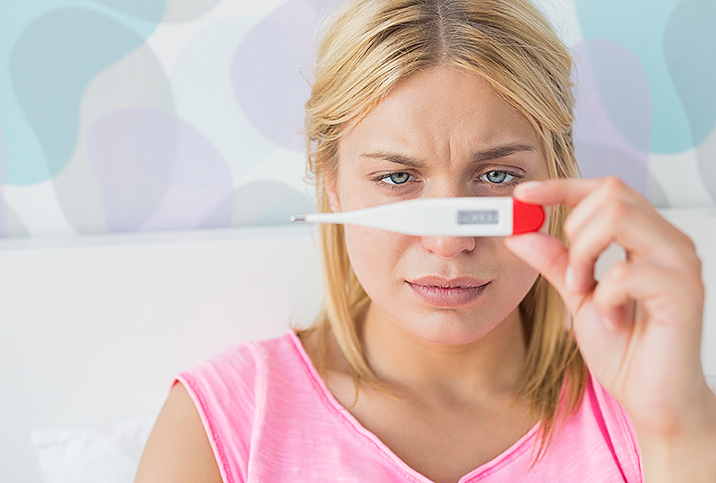The Effects of Leaving Fat Women Out of Birth Control Research

"Fatphobia" permeates every aspect of health care, from bias by medical providers to access to procedures with arbitrary weight guidelines. One area of impact is birth control.
Historically, fat cis-women have been largely excluded from clinical trials for contraceptives. The research was instead formulated for one body type. It wasn't until 2010 that a study was published specifically about the safety of oral contraceptives for obese women.
The 2010 study published in Obstetrics & Gynecology journal found women of normal and higher weights displayed comparable ovarian suppression during oral contraceptive use. This means the pill works if taken consistently, regardless of weight.
The Food and Drug Administration approved the first oral contraceptive in 1960, meaning fat women's exclusion from clinical trials went on for half a century. This raises questions about how secure fat women can feel in their birth control and fatphobia's impact on contraceptive care.
Plan B's failure for fat people
In 2012, a large study was published in the international reproductive health journal Contraception on the effectiveness of emergency contraception methods. The study authors, led by Anna Glasier, M.D., found the medication levonorgestrel, commonly known as the Plan B pill, may not prevent pregnancy in women weighing 165 pounds or more—and does not work at all in women who weigh more than 175 pounds. The average American woman weighs 170 pounds, according to the Centers for Disease Control and Prevention (CDC).
New warning labels for Plan B were issued in 2014 with the updated safety advisory, but the efficacy of emergency contraceptives for fat women raised serious concerns. The implications of a failed contraceptive can be devastating.
These findings of emergency contraceptive failure beg the question of why drugs are on the market when they have not been tested on bodies with varying body mass indexes. BMI is a measure of body fat based on weight and height. A 2013 study published in the peer-reviewed scientific journal Women's Health noted, "to date, providers of hormonal contraceptive methods employ a one-size-fits-all approach. Most PK studies [how the drug moves through the body] exclude women who are greater than 130 percent of their ideal body weight."
Impacts of fatphobia on contraceptive care
The impacts of prior weight exclusion raise concerns about efficacy and safety. Fatphobia can lead to false and harmful assumptions by medical professionals, said Jessica E. Morse, M.D., M.P.H., assistant professor of obstetrics and gynecology at the University of North Carolina School of Medicine.
"Contraception and sexuality are already hard enough to talk about," Morse said. "Providers need to be open-minded and thoughtful as patients share their fertility goals and work towards approaches that work for the patient, no matter their size or weight."
Fatphobia impacts contraceptive care in two ways, said Cat Pausé, PGDip Public Health, Ph.D., M.A., a fat studies scholar at Massey University in Palmerston North, New Zealand.
"Fat people are less likely to access health care because they have been shamed/abused/harassed in this space previously, and second, many of the contraceptives are not as efficacious for fat people, like Plan B, for example," Pausé said.
Formerly excluding body-diverse individuals from clinical trials stunts access to evidence-based reproductive care, Pausé noted.
"We need to work towards fat reproductive justice, ensuring that fat people have access to the information and resources needed to control their reproductive health," Pausé said.
On the impact of excluding fat women from prior clinical trials, Morse said, "Aside from a lack of clinical data, it perpetuates the shame and stigma of obesity."
Can fat women feel safe about their birth control?
Considering the previous lack of data, how safe can fat women feel about birth control? Clinical trials are now more inclusive, Morse said.
"Although it is true that many older clinical trials did not include women greater than 130 percent of their ideal body weight, modern clinical trials enroll women across the weight spectrum," she said. "As we move forward and look to new contraceptives, this lack of data should become less salient.
"There is not clear evidence to suggest that hormonal birth control pills are significantly less effective in obese women," Morse continued.
Pausé said having a doctor you trust is part of feeling secure. It's important that your doctor explain specific forms of birth control that might be best for you, with your body type in mind. Some types of birth control have proved more effective for certain body types.
'There is not clear evidence to suggest that hormonal birth control pills are significantly less effective in obese women.'
Birth control methods that are not hormonal (copper IUDs, condoms, diaphragms) or do not rely on systemic levels of hormones to prevent ovulation (hormonal IUDs, copper IUDs, condoms, diaphragms) should continue to be equally effective independent of weight, Morse said.
"There are some specific methods [the patch, for example] with prescribing concerns based on weight," Morse added.
It's difficult to draw blanket conclusions about safety and efficacy for all types of birth control for fat women, and it's critical to look at data criteria for each option.
A 2017 study published in Contraception explored the landscapes around short-acting combined hormonal contraceptives and obesity and noted the baseline body weights in pre-2000 trials were in the range of 130 to 140 pounds. The eligibility criteria for other clinical trials required subjects to be within 25 percent of "ideal" body weight. Vaginal rings, for example, excluded women with BMIs over 30 kilograms per square meter (kg/m²) in their registration trials, making it difficult to draw initial conclusions about efficacy for high-BMI people. A BMI of 30 or higher falls under the "obese" category.
Understanding contraceptive failure rates
The Pearl Index is the statistical measure of efficacy in contraceptive trials. The aforementioned study examined emerging data in contraceptive trials, which suggest rising rates of obesity in America may contribute to the Creeping Pearl phenomenon, or the rise of contraceptive failure in clinical trials of combined hormonal contraceptives (CHC). The study called for broader inclusivity of patient criteria, including race, BMI, ethnicity and age.
"Contraceptive failure rates are dependent on the method and the user," Morse said. "So it varies a lot, but in general, highly effective methods [IUDs and implants] that require no user input tend to be incredibly effective independent of weight."
Making a decision that's right for you
Sharing risks for specific types of birth control depends on a variety of factors, from doctors giving their patients adequate information to pharmaceutical companies issuing warning labels on birth control that hasn't been tested on high-BMI populations.
The 2017 Contraception study noted, "results from modern contraceptive trials, including language regarding effects of BMI and other factors on study results, can and should be communicated in product labeling to facilitate informed decision-making by women and providers."
"All pharmaceutical trials should ensure that they include fat and superfat people in appropriate numbers to ensure efficacy of their drug on fat people," Pausé said. "Doctors in training must receive technical and practical instruction on how to provide care for fat and superfat people.
"The 70-kg male body has never been the norm, and we must stop treating it as such in the biomedical field," Pausé added.


















